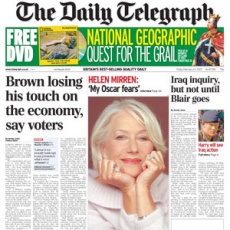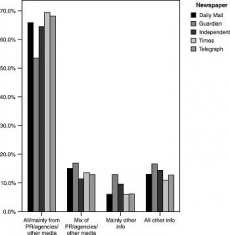The Telegraph
The Daily Telegraph is a UK-based national newspaper published by Telegraph Media Group[1]. The current owners are David Barclay and Frederick Barclay, known collectively as the Barclay Brothers[2]. Until 2004 the paper was owned by Conrad Black and Hollinger International[3]. Black was jailed for fraud and obstructing justice in 2007[4].
History
The Daily Telegraph was founded in 1855. Its first proprietor was Lord Burnham. In 1928, it was sold to Sir W. Berry (Viscount Camrose), Sir G. Berry (Viscount Kemsley) and E. Illife, (later Lord Illife). Viscount Camrose acquired the interests of the other two proprietors in 1937. He was succeeded as Editor-in-Chief, by M. Berry (Lord Hartwell) in 1968. The paper was acquired by Conrad Black in 1987.[5]
Editor Charles Moore left the Telegraph in 2003 to work on a biography of Margaret Thatcher. His successor Martin Newland had a more difficult relationship with leader writer Dean Godson, who was described at the time as ‘Conrad Black’s favourite commissar’, by the Evening Standard.[6]
When Black lost control of the Telegraph Group’s parent company, Hollinger International, a year later, Godson’s departure followed soon afterwards.[7]
In his 2004 book on David Trimble, Godson expressed his thanks to Black and his fellow Hollinger International directors Barbara Amiel and Dan Colson.[8]The three were being sued by the company at the time over the alleged diversion of £391 million between 1997 and 2003.[9]
Later that year, Telegraph editor Martin Newland said that he "soon came to recognise we were speaking a language on geopolitical events and even domestic events that was dictated too much from across the Atlantic. It's OK to be pro-Israel, but not to be unbelievably pro-Likud Israel, it's OK to be pro-American but not look as if you're taking instructions from Washington. Dean Godson and Barbara Amiel were key departures." [10]
Reliance on PR material and news agencies
According to research conducted in 2008 by Professor Justin Lewis at Cardiff University, up to 70 per cent of news stories published by The Times are wholly derived from PR activity or news agencies, or replicated from other media sources.
Lewis' research found that that "The Times and the Daily Telegraph appear to replicate a significantly higher percentage of agency/PR material than the Guardian, which, according to these data, is the most independent of the newspapers. While just over half the stories in the Guardian come wholly or mainly from pre-packaged sources, this compares with around two-thirds of the stories on other newspapers. By the same measure, the Guardian is also more likely to use a mix of information or to get information from other sources".
Lewis' study concludes, "What is clear from this study is that the quality and independence of the British news media has been significantly affected by its increasing reliance on public relations and news agency material; and for the worse!"[11].
Controversies
Relationship with MI6
The Telegraph has a long-standing reputation for being close to the British intelligence services. The Canadian journalist Eric Downton told Philip Knightley:
- Roy Pawley, foreign editor and later managing editor of the Telegraph was a servile lackey of Five and Six. Telegraph foreign correspondents were given direct orders to work with Six. When I went to Moscow for the Telegraph shortly after Stalin’s death, I was ordered to work for the Six man in the embassy who had the usual cover of Press attaché. Before I left London for Moscow I was briefed by Six officials on what they wanted me to do.[12]
Galloway case
The Telegraph was successfully sued for defamation by George Galloway in 2004. He was awarded £150,000 in damages after allegations that he was in the pay of Saddam Hussein were judged to be "seriously defamatory". The original story was published in April 2003 and alleged that Galloway had secretly received sums in the order of £375,000 a year from Saddam and he had diverted monies from the oil-for-food programme, thus depriving the Iraqi people - whose interests he claimed to represent - of food and medicines. The paper also alleged the MP had used the Mariam Appeal as a front for personal enrichment and what he had done was tantamount to treason.[13]
Selling the Iraq War
The Daily Telegraph has been cited as instrumental in the propaganda drive to convince the British and European public to support the Iraq War. The neoconservative Devon Cross lobbied to sell the Iraq War to the UK and Europe using the Policy Forum. The reason for this is stated on the Policy Forum's website:
- American foreign policy and its goals and motivations in undertaking the War on Terror were increasingly subject to caricature and worse in the European media, and to outright misrepresentation in the broader public debate[14].
The Policy Forum claimed success in selling U.S. foreign policy to the British media including the Daily Telegraph. For these lobbying efforts, at the end of 2007, the US Department of Defense paid the Policy Forum around $80,000 which was paid to Devon Cross[15].
Devon Cross was at the Policy Forum at the same time as Richard Perle who also served as a director of Hollinger International, the firm that owned the Telegraph.
Con Coughlin
Con Coughlin is the defence editor of the Daily Telegraph,[16] and was previously the executive foreign editor.[17] Coughlin controversially received stories directly from MI6. His relationship with the British intelligence services was exposed after a legal writ was served against The Telegraph for publishing a suggestion that Colonel Gadafy's son was involved in a fraud[18]. Coughlin also printed a story linking Saddam Hussein with Al-Qaeda and he has published articles on Iran using (in the words of the Campaign Against Sanctions and Military Intervention in Iran) "unnamed and untraceable sources"[19][20][21].
Pentagon distribution
According to Jim Lobe "the Telegraph’s often-dramatic accounts of all kinds of Islamic skullduggery appeared frequently in the Pentagon’s “Early Bird,” a compilation of up to 50 or so “must-read” news stories, including Coughlin’s, distributed throughout the national-security bureaucracy every weekday morning, during the six-year stewardship of Donald Rumsfeld[22].
Pro-Israel stance under Conrad Black
While Conrad Black was the proprietor of the Telegraph the newspaper's journalists complained that his pro-Israeli views were affecting editorial policy. According to a report in The Guardian:
- "Three prominent writers - all of them past contributors to Mr Black's Telegraph group have signed a letter to the Spectator accusing him of abusing his responsibilities as a proprietor. Such is the vehemence with which Mr Black has expounded his pro-Israeli held view, they say, no editor or reporter would dare to write frankly about the Palestinian perspective"[23].
People
Editors
- Max Hastings 1986-1995
- Charles Moore 1995-2003
- Martin Newland 2003-05
- John Bryant 2005-06
- Will Lewis 2006-
Journalists
Contact
- Address:
- Phone:0044 207 9312000
- Fax:
- Website: http://www.telegraph.co.uk/
Notes
- ↑ Telegraph Media Group, Media A-Z, The Guardian, Accessed 09-May-2009
- ↑ BBC News, Barclays triumph in Telegraph bid, 23-June-2004, Accessed 09-May-2009
- ↑ Abigail Rayner, Hollinger International to hit Lord Black with fresh legal claims, The Times, 04-May-2004, Accessed 08-May-2009
- ↑ BBC News, Conrad Black convicted of fraud, 13-July-2007, Accessed 09-May-2009
- ↑ David Butler and Gareth Butler, Twentieth Century British Political Facts 1900-2000, Macmillan, 2000, p.529.
- ↑ In the Air, the Evening Standard, 29 October 2003.
- ↑ Crossed Lines at the Telegraph - Media Diary, The Observer, 27 June 2004.
- ↑ Himself Alone: David Trimble and the Ordeal of Unionism, by Dean Godson, Harper Perennial, 2005, p.xx
- ↑ Black and wife named in $1.25bn lawsuit, by Stephanie Kirchgaessner FT.com, May 10, 2004.
- ↑ Newland unleashed, by Maggie Brown, The Guardian, 15 November 2004.
- ↑ Justin Lewis, A Compromised Fourth Estate? UK news journalism, public relations and news sources, Journalism Studies, Volume 9, Issue 1 February 2008
- ↑ Philip Knightley, Why spies and scribes have a lot in common, Khaleej Times, 11 August 2006.
- ↑ Chris Tryhorn, Galloway wins libel case against Telegraph, The Guardian, 02-December-2004, Accessed 14-May-2004
- ↑ Policy Forum, About Us, Accessed 08-April-2009
- ↑ Jim Lobe, Is the Pentagon Policy Shop Funding Likudist Fronts?, IPS, 18-March-2008, Accessed 08-April-2009
- ↑ Con Coughlin, The Telegraph, accessed 22 October 2012
- ↑ Con Coughlin, Telegraph blogs, accessed 7 August 2008.
- ↑ Britain's security services and journalists: the secret story, by David Leigh, British Journalism Review Vol. 11, No. 2, 2000, pages 21-26.
- ↑ Press Watchdog slammed by 'Dont Attack Iran' Campaigners, CASMII UK Press Release: 1 May 2007, accessed 23 June 2009
- ↑ Con Coughlin, "Does this link Saddam to 9/11? A document discovered by Iraq's interim government details a meeting between the man behind the September 11 attacks and Abu Nidal, the Palestinian terrorist, at his Baghdad training camp", Sunday Telegraph, 14 December 2003, p 21.
- ↑ CampaignIran.org, Press Watchdog slammed by 'Dont Attack Iran' Campaigners, CASMI, Accessed 13-June-2009
- ↑ Jim Lobe, Trans-Atlantic Con Man, IPS, 12-June-2009, Accessed 12-June-2009
- ↑ Matt Wells, The Black arts leave writers riled, The Guardian, 16-March-2001, Accessed 06-October-2009

